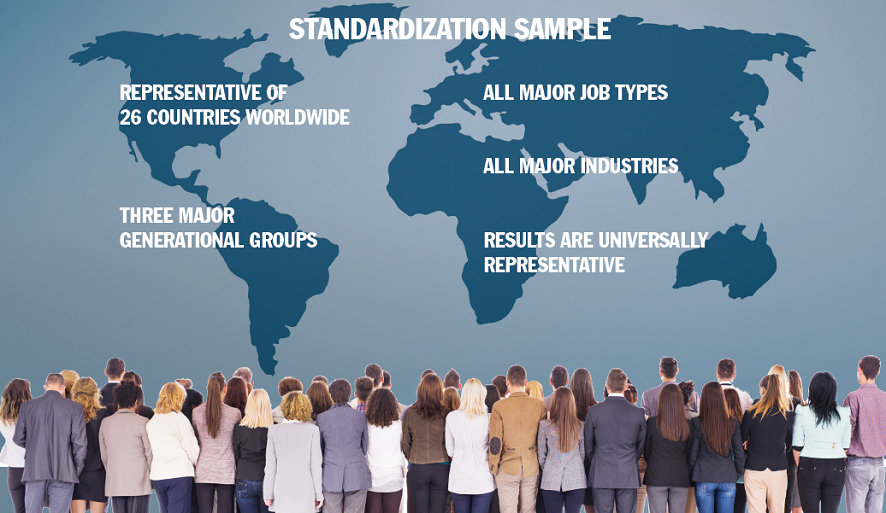The Employee Experience Gap
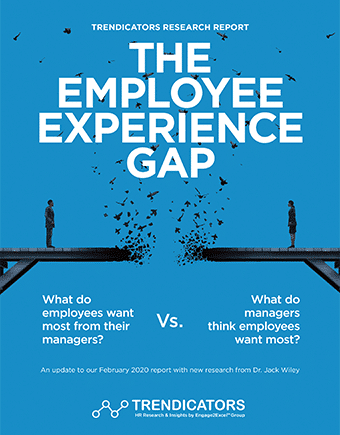
INTRODUCTION
Over the past several years, Employee Experience has become a term beloved in HR circles, particularly among HR consultants and platform providers. Broader than Engagement, Employee Experience is meant to encompass everything an employee sees, hears, feels and believes about their employment. Employee Experience has gained widespread use and acceptance, returning more than 600M hits on Google compared with 387M hits for Employee Engagement.
Overlooked Influences: Unfortunately, two factors are often overlooked when it comes to influencing employee experiences. The first is what employees actually want from their experience with an employer over the course of their career. The second—and quite possibly most important—overlooked factor is the role of the manager in influencing employees’ career experiences.
In February 2020, we tackled this subject in one of our most popular reports, What Employees Want Most From Their Manager. Based on ground-breaking research by Dr. Jack Wiley, Engage2Excel Group’s chief scientific officer, The Employee Experience Gap is an update to that report with important new insights based on a survey of 1,000 managers in the U.S. conducted during the current pandemic. In that survey, Dr. Wiley asked managers what they thought employees wanted most from their managers. The results, presented on page 11, show that significant gaps exist in five of the eight attributes that employees value most in a manager.
Employee Experience Matters Now More Than Ever: The devastating health and economic impacts of the pandemic have spotlighted the need for organizations to focus on helping managers understand what employees want and need. Dr. Wiley’s research, which will be presented in his upcoming book, The Employee-Centric Manager, addresses an important link missing in most corporate programs. Organizations spend millions of dollars on programs to recruit, recognize and incentivize employees often with little regard for the manager. The manager, however, is the individual with the greatest influence on employee engagement, performance and retention. Employee-centric managers are generally more capable of solving almost all challenges facing them. They know how to connect with employees, keep them on track, ensure they feel recognized and rewarded and help them achieve or exceed performance expectations.
Minding the Employee Experience Gap: If your organization has been overlooking the role of the manager in its recognition and recruiting programs, it’s time to rethink the role of HR in helping managers create more meaningful and relevant “in-the-moment” experiences for candidates and employees.
Download
 hbspt.cta.load(123973, 'f0d951d8-2da1-4760-9c61-199d3a38e06a', {});
hbspt.cta.load(123973, 'f0d951d8-2da1-4760-9c61-199d3a38e06a', {});
An Interview with Dr. Jack Wiley
Readers of Trendicators reports are familiar with the work of Dr. Jack Wiley, Engage2Excel Group’s chief scientific officer. For more than three decades, Jack has conducted research on a broad range of workplace issues. This research covers a range of topics such as goal setting and performance feedback, helping managers get better at recognition, understanding what motivates candidates, measuring engagement to improve competitive advantage and understanding why employees leave.
This report presents an overview of what promises to be Jack’s most influential work to date. Recently, we sat down with Jack to understand his motivation and objectives for conducting this research.
Q: Why did you begin studying what employees want most from their immediate supervisor?
A: This work is an extension of my research that began in the mid-1980s and focused on what employees want most from their organization. It seemed highly relevant to follow that research with another research question, which is what employees want most from their immediate manager. The idea was to have employees describe—in their own words—what they most need to help them be more effective in their jobs.
Q: Why is this topic important in organizational psychology and for business leaders, HR executives, and managers?
A: We have several excellent theories of managerial behavior and performance, but none of them are based on the employee voice regarding what they want most from their immediate boss. Unlike any research previously conducted, this is focused on the employee as the identifier of the things that are most important to them as the followers of managers and supervisors. From a practical perspective, managers need help in understanding how to become more effective in today’s workplace, where employees’ perceptions matter more than ever before.
Q: What are your plans for bringing this research to a broader audience of managers?
A: Later this year, we’ll be publishing a book that translates the research findings into practical guidance any manager can use to improve his or her effectiveness.
Stay tuned for more details on Jack’s upcoming book and other related developments. In the meantime, the team at Trendicators and Engage2Excel are honored to offer our readers the following preview of Jack’s work along with his latest research on the perceptions of managers.
 Dr. Jack Wiley Chief Scientific Officer, Engage2Excel Group
Dr. Jack Wiley Chief Scientific Officer, Engage2Excel Group
Dr. Wiley is an award-winning organizational psychologist, researcher, author and leadership consultant. For more than three decades, he has focused on two big research questions: What do employees want most? What organizational factors best promote employee engagement, performance confidence and business success?
In his upcoming book, The Employee-Centric Manager, Jack will present the results and actionable takeaways from a decade-long investigation. A groundbreaking analysis with enormous practical implications, The Employee-Centric Manager will offer easy-to-follow guidance that managers can put into immediate action to improve employee engagement, retention and productivity.
Download
 hbspt.cta.load(123973, 'f0d951d8-2da1-4760-9c61-199d3a38e06a', {});
hbspt.cta.load(123973, 'f0d951d8-2da1-4760-9c61-199d3a38e06a', {});
Why do employee perceptions of managers matter?
Understanding what employees want most in a manager is important for HR leaders and the executives and managers they support for a variety of reasons. Today, when all organizations are competing for talent, the role of the manager is vital. To be successful, organizations need managers with the ability to engage, motivate and lead teams very effectively. Employing managers who demonstrate the attributes that employees want most, especially as a result of the pandemic, is critical to attracting and retaining the talent organizations need to achieve their fundamental business objectives.
Organizations and teams led by managers who display the attributes that employees want most have greater success, regardless of how you measure it: whether in terms of employee engagement, employee productivity, the quality of team interactions or overall team performance.
Clearly, more training is needed in people management skills. In a recent survey of 1,000 U.S. managers, Dr. Wiley found that while 71% indicated they received some formal management training, 61% indicated that this training lasted four hours or less.
The Bottom Line: Attracting and retaining the talent needed to achieve organizational objectives depend on how managers show up and operate. Managers who embody the attributes employees want most in the way they operate their business achieve a host of positive results for themselves and the teams, departments and business units they lead.

Download
 hbspt.cta.load(123973, 'f0d951d8-2da1-4760-9c61-199d3a38e06a', {});
hbspt.cta.load(123973, 'f0d951d8-2da1-4760-9c61-199d3a38e06a', {});
Groundbreaking global research by Dr. Jack Wiley reveals what employees want most from their immediate supervisor
Few variables have greater influence on employee productivity and retention than the relationship between employees and their immediate supervisor. However, until now, what employees want most from their managers has not been the subject of comprehensive and concentrated scientific analysis.
This report presents an overview of the results and actionable takeaways from a decade-long investigation involving more than 100,000 survey participants. Representing 26 countries, all major job titles and three generations across all major industries, the research reveals eight attributes that managers at any level within any organization can adopt to improve managerial effectiveness, create greater career experiences for employees and deliver better results for employers.
Based on groundbreaking research that has enormous practical implications, the eight attributes employees want most can be immediately put into action by any manager who seeks to improve employee engagement, retention and productivity.
Unlike the anecdotal advice offered in management self-help books, the eight attributes discussed on the following pages are based on rigorous analysis, and they are easy for managers to understand and adopt. Equally important, these eight attributes have been validated to account for more than two-thirds of the variance of effectiveness scores from 180-degree performance ratings.
Download
 hbspt.cta.load(123973, 'f0d951d8-2da1-4760-9c61-199d3a38e06a', {});
hbspt.cta.load(123973, 'f0d951d8-2da1-4760-9c61-199d3a38e06a', {});
Overview: What do employees value most in their immediate manager?
The table below shows the eight attributes that employees worldwide want most from their managers. Five of these attributes pertain to behaviors, one is skill-related and two refer to personal values.
Five Behaviors: The five behaviors identified in the research pertain to providing support and consideration, demonstrating recognition, treating employees with dignity and respect, providing employees with clear performance expectations and rewarding performance contributions.
One Skill: The one skill that employees feel most keenly about and that emerged as an attribute is problem-solving and decision-making. Employees don’t just want managers to make decisions; they want managers to demonstrate competence in making decisions that positively affect work outcomes.
Two Values: The values employees want most in a manager are to be just and equitable in their decision-making and to be honest and trustworthy. When managers say something, employees need to believe it’s true. When managers indicate that they’ll follow through on something, employees want to have confidence that their manager will do so in a fair manner.
Not all of these attributes are equally weighted. Support and consideration are what 26% of the world’s workers said was most important to them. This is double the next highest attribute that has to do with providing recognition, followed closely by communicating performance expectations and problem-solving and decision-making skills. The just and equitable treatment of employees and treating employees with dignity and respect are ranked fourth and fifth, respectively, followed by rewarding performance and being honest and trustworthy.
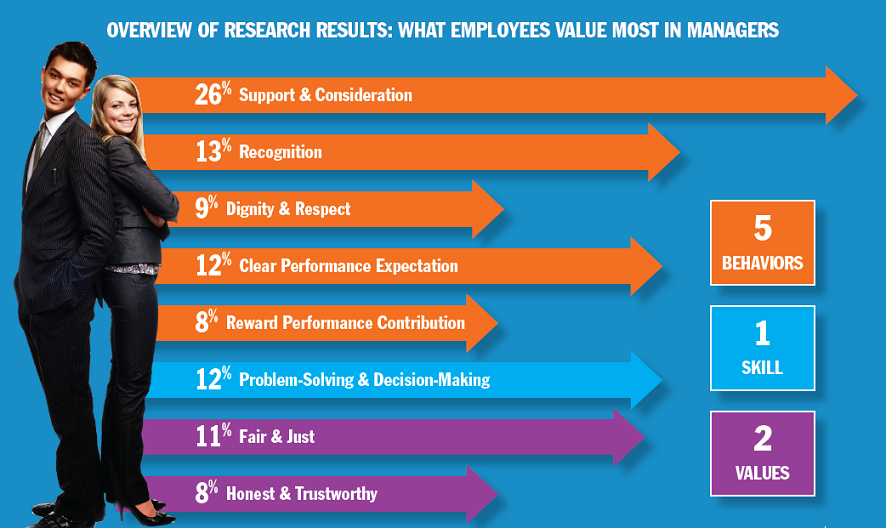
Download
 hbspt.cta.load(123973, 'f0d951d8-2da1-4760-9c61-199d3a38e06a', {});
hbspt.cta.load(123973, 'f0d951d8-2da1-4760-9c61-199d3a38e06a', {});
Five Managerial Behaviors
Employees Value Most
The five behaviors employees value most in a manager paint a clear picture of what all individuals need to perform effectively and achieve psychological well-being in the workplace.
Support and Consideration: Employees want a manager who will be available, listen to the issues and concerns that they have and adopt a positive point of view with regard to the subordinates’ contributions and potential to contribute. They want a manager who will support them emotionally, support them with resources and help them get their job done.
Recognition: Employees want to feel appreciated for the knowledge, skills, abilities and competencies they bring to the job. However, in addition to work contributions, employees are interested in being recognized for their passion and for their willingness to go the extra mile to accomplish things.
Dignity and Respect: Employees want to be treated with respect, regardless of how much experience they have, their number of years in the job or even the level at which they perform in relation to their coworkers. Demonstrating respect for diversity in the workplace is increasingly important in the world in which we operate.
Clear Performance Expectation: Employees know that their performance will be evaluated. They need help in understanding what is expected of them to be successful, which is essential to maintaining self-esteem. Once they understand the expected contributions and outcomes, they are better informed and motivated to perform.
Rewarding Performance Contributions: The role of the manager in rewarding performance is overlooked by most theories of managerial behavior and performance. But this is very important to employees. They want to be rewarded for the contributions they’re making, not just financially but also in terms of their personal development. Employees want more opportunities to be trained, to develop their skills and career, and to know that their manager is invested in helping them advance their careers.
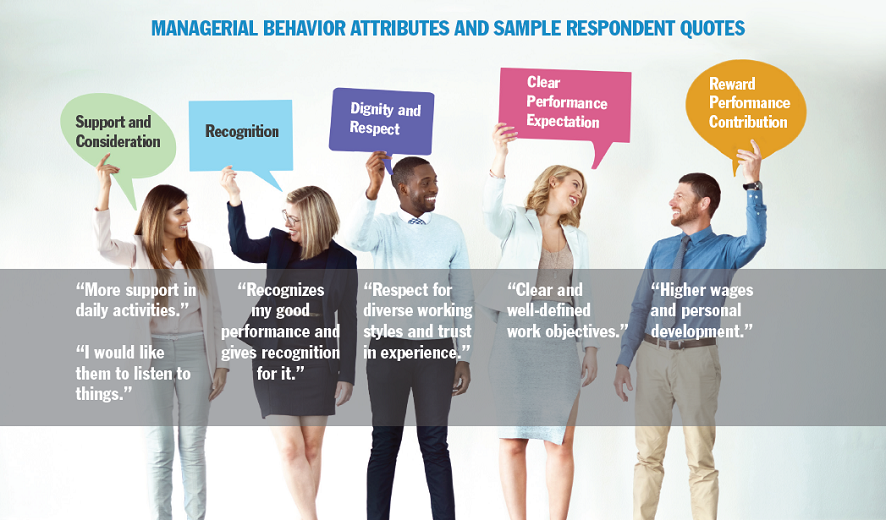
Download
 hbspt.cta.load(123973, 'f0d951d8-2da1-4760-9c61-199d3a38e06a', {});
hbspt.cta.load(123973, 'f0d951d8-2da1-4760-9c61-199d3a38e06a', {});
One Managerial Skill
Employees Value Most
The one skill that employees value most in their immediate supervisor is problem-solving and decision-making. If you stop to think about this, it’s not difficult to understand why this is so important to employees. In today’s world, where changes occur so quickly, and managers and employees are stretched thin, problem-solving and decision-making at the managerial level have immense implications for the quality of the work environment.
Layers of management have been taken out of organizations so that managers, as a result, have far greater spans of control. Often, teams can’t move forward without their manager’s involvement in solving a particular problem. That may include the allocation of resources or a work-around for a political consideration inside the organization.
Employees highly value managers who are skilled at problem-solving and decision-making.
Employees don’t just want a manager to make decisions. They want a manager who is skilled at making decisions that advance the cause for the team and enable them to successfully complete their work as part of a winning team.
At the end of the day, all employees want to be on a winning team. Managers who are effective at problem-solving and decision-making foster a sense of confidence in their subordinates. This contributes not only to employee motivation but also to high levels of engagement and organizational citizenship. When employees know they’re part of a successful operation, they are willing to go above and beyond what’s asked of them to get the job done.

Download
 hbspt.cta.load(123973, 'f0d951d8-2da1-4760-9c61-199d3a38e06a', {});
hbspt.cta.load(123973, 'f0d951d8-2da1-4760-9c61-199d3a38e06a', {});
Two Managerial Values
Employees Value Most
Another area that is largely missing from academic taxonomies of managerial behavior and performance is the attributes we regard as values. Employees say that there are two values that are most important to them.
Just and Equitable: Employees want managers who treat people equitably and fairly at all times without playing favorites. Certainly, there may be employees whom managers can rely on more because of the time that they’ve worked with the manager or the experience level they possess. But employees know whether their manager is fair. Effective managers size up the situation and render fair decisions, and those decisions will be consistently replicated across a variety of circumstances.
Honest and Trustworthy: The other value employees want most is honesty and trustworthiness. This is fundamental. Employees want managers who tell the truth, especially in difficult situations. Managers who shade the truth or cut corners in telling the truth lose a tremendous sense of followership as a result. The consequences can be very devastating for them. When employees don’t have confidence in the honesty of their manager, and when they don’t believe that what their manager says is true or that they’re not going to follow through on promises, this diminishes motivation, engagement and advocacy for the group. Why would employees encourage others to come into the group or to recruit talent into the group if they don’t believe the manager is honest and trustworthy? Who wants to put their career in the hands of someone who isn’t honest with them?
These are fundamental human values that are very important to all employees worldwide in sizing up what they want most from their manager.

Download
 hbspt.cta.load(123973, 'f0d951d8-2da1-4760-9c61-199d3a38e06a', {});
hbspt.cta.load(123973, 'f0d951d8-2da1-4760-9c61-199d3a38e06a', {});
The Managerial Attributes Employees Want Most Determine 67% of Effectiveness Scores
Not surprisingly, how managers demonstrate the eight attributes employees want most directly correlates with how employees view the overall effectiveness of their boss as a manager.
The analysis: To arrive at this conclusion, a separate dataset involving 10,000 respondents in the U.S. was utilized. These data included a series of questions on how employees rated their immediate supervisor. The objective was to understand the degree of correlation between the ratings employees provide of their immediate manager on the eight attributes and the ratings they provide on the overall effectiveness of their manager. Regression analysis was utilized to understand the extent to which the ratings of the attributes of the manager account for the ratings on overall performance.
A clear and direct correlation: The regression analysis revealed that 67% of the overall rating of managerial effectiveness can be explained by the ratings of the eight attributes employees want most in a manager. In other words, there’s not much left that goes into an employee’s view of their immediate manager’s performance than the rating of these eight attributes, the very things they are seeking from their manager.
Why is this important? If managers want to be seen by their employees as effective managers, then the effectiveness of their overall performance can fundamentally be explained by how they demonstrate these eight attributes. As a result of these findings, Dr. Wiley is currently developing new tools and resources for measuring and improving manager effectiveness, to be released later this year.

Download
 hbspt.cta.load(123973, 'f0d951d8-2da1-4760-9c61-199d3a38e06a', {});
hbspt.cta.load(123973, 'f0d951d8-2da1-4760-9c61-199d3a38e06a', {});
The Employee Experience Gap: How Managers Misunderstand What Employees Want Most
Given the strong correlation between the demonstration of what employees want most and managerial effectiveness scores, it is important to understand where gaps may exist between the perceptions of employees and managers.
Recently, Dr. Wiley asked a representative sample of 1,000 people managers working in the United States what they believe employees most want from them. This survey was conducted in the midst of the current pandemic.
Managers correctly identified the following three employee wants: treating employees with “dignity and respect,” communicating “clear performance expectations” and “rewarding performance contributions.”
However, there were some significant mismatches as well. Managers really only had a faint idea of other employee wants, especially in relation to providing “recognition,” being “fair and just” and “demonstrating support and understanding” for employees. In these cases, the percentage of employees who declared one of these factors was the most important thing they wanted from their manager far exceeded the percentage of what managers themselves indicated. In addition, managers overestimated the importance of two attributes: being “honest and trustworthy” and “problem-solving and decision-making skills.” This speaks to a lack of awareness of the importance of these attributes on the part of managers in enabling employee experiences that drive increased performance and retention.
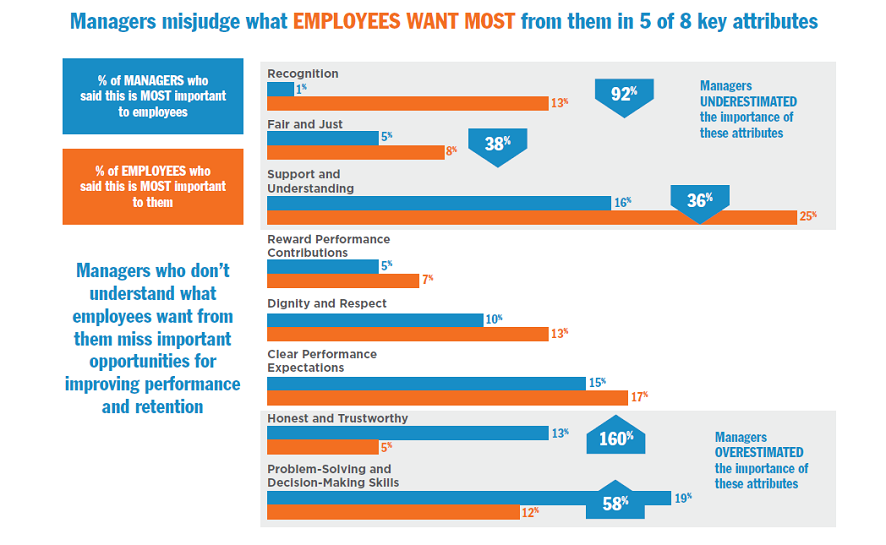
Download
 hbspt.cta.load(123973, 'f0d951d8-2da1-4760-9c61-199d3a38e06a', {});
hbspt.cta.load(123973, 'f0d951d8-2da1-4760-9c61-199d3a38e06a', {});
Four Ways That Every Manager Can Improve Their Effectiveness
If there’s only a short list of things that managers could do or focus on to improve their perceived effectiveness in the eyes of their employees, what are those things? Regression analysis helps determine which attributes are most important and predictive of the rating an employee would provide for a manager’s overall performance in a 180-degree performance review. This analysis reveals that there are four things every manager can do to improve their perceived effectiveness. These attributes have never mattered more than now as all organizations and employees continue to struggle with the health and economic consequences of the pandemic.
Show Support and Understanding
Be present and accessible to employees, providing help in daily activities. Provide encouragement, standing up for employees and following through on employee concerns and issues. Exert the effort necessary to listen to your employees, ask them questions, listen to what they have to say and find out what their issues are. Providing a listening ear to employees, genuinely, honestly and thoughtfully, will raise your effectiveness as perceived by your employees.
Provide Recognition
Recognition refers to complimenting and praising good work, giving employees credit for good ideas and recognizing employees for their loyalty to the job and the organization. It is important for you to recognize both teams and individuals. Managers who are good at this personalize recognition to the specifics of what an employee does well, and they also recognize the passion, skills and abilities of employees, as well as their achievements.
Communicate Clear Performance Expectations
Employees want managers who communicate work priorities, provide clear directions for the assigned work and deliver honest and helpful feedback on how they are performing. Effective managers connect the work to the bigger purpose of the organization, that is, to its mission and its values. Employees also want timely communication that is clear, concise, honest and transparent. As a result, employees understand what is expected—in terms of productivity, quality, and timeliness.
Treat Employees with Dignity and Respect
In action, treating employees with dignity and respect refers to the general notion of treating people well, as competent adults who want to make a useful contribution to the team’s efforts. It involves trusting the experience employees bring to the job and showing respect for diverse work styles. It can be demonstrated in the concern managers show for the welfare of their employees, for example, in the care managers take to ensure the safety and physical well-being of employees.
Download
 hbspt.cta.load(123973, 'f0d951d8-2da1-4760-9c61-199d3a38e06a', {});
hbspt.cta.load(123973, 'f0d951d8-2da1-4760-9c61-199d3a38e06a', {});
